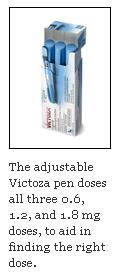New Type 2 Diabetes Treatment Victoza Enters the Market

However, while approval spells safe to use, the product will carry a “black-box” warning, FDA’s method for cautioning against potentially serious side effects – in Victoza’s case, medullary thyroid carcinoma, or MTC (a very rare cancer of specific cells within the thyroid gland called C-cells). While signals for MTC still have never been seen in humans, the drug will not be recommended in those with a personal or family history of MTC or multiple endocrine neoplasia syndrome type 2, a rare genetic disorder that predisposes individuals to MTC. Due to the warning, various post-approval studies will be required of Novo Nordisk, including a 15-year cancer registry, a long term risk-evaluation study, and further preclinical studies - this is in addition to a cardiovascular safety study. And that may be a good thing, as it means Victoza could have lots of supportive safety data in the long run. Overall, we found the FDA’s response very positive – in its approval, the agency stressed the importance of getting drugs on the market that reduced the long-term complications associated with diabetes, and we definitely see Victoza as a step in the right direction (leaders of the FDA said as much in a recent article in the prestigious New England Journal of Medicine). The drug is now available in 90% of US pharmacies nationwide – for one person’s experience with Victoza, see Test Drive in this issue of diaTribe, and if your current therapy isn't working for you, think about asking your healthcare provider about GLP-1. --LR







